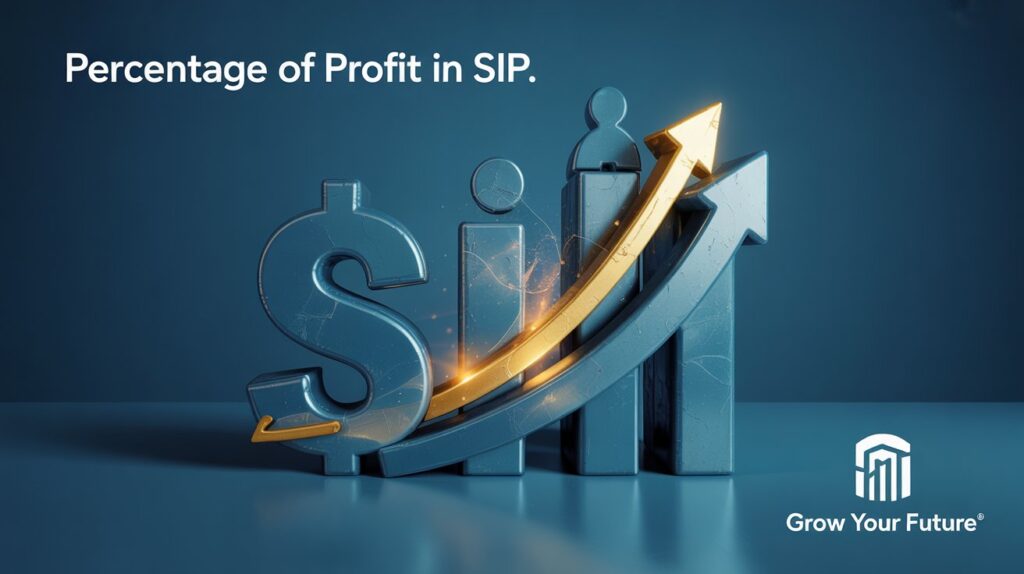In the fast-paced world of finance today, everyone knows, even I believe, that investing in SIP is one of the most crucial aspects of securing our financial future. An increasing number of investors are becoming attracted to Systematic Investment Plans (SIPs) as a method of wealth accumulation. However, in the excitement of it all, some big questions are rolling over the internet like is SIP investment safe or investing in SIP is safe or not for the long term. The quick answer is debatable, but it can be said that investing in SIP is one of the simplest and structured ways to create our financial future.
However, it is usually not that simple. The safety of SIP investment involves exposing the benefits of SIPs and questioning their relationship in accordance to the market securities, risk aspects, and obtaining long-term financial growth. This is an article that seeks to expose the truth about SIP investment and provide the confidence and information necessary for various investors to know the risks associated with SIP investment, taking into account their financial future. Knowing is SIP safe in the long run and under various market conditions can enable you to achieve your financial future successfully. So, let’s dive into a little systematic investing and consider whether SIP is safe or not.
Also Read: How to Open a SIP Account
Understanding Systematic Investment Plans (SIPs)
SIPs, or Systematic Investment Plans, are a systematic approach to investing in mutual funds. SIPs promote disciplined savings by allowing investors to invest fixed amounts, every so often. When the stock market rises or falls significantly, the pre-defined investment schedule allows investors to maintain a consistent approach to building their portfolios. In addition, systematic investment does average the cost of investing over time, a concept referred to by some as rupee cost averaging.
When investing systematically, investors are essentially purchasing units of mutual funds. With each contribution, investors will purchase as many units of the fund as their respective contribution value will allow based on the current Net Asset Value (NAV) of the fund. As prices rise, you will buy fewer units, and as prices fall, you will buy more units.The cost-averaging effect can potentially allow for lower average costs over time, especially in volatile markets. This is much more pleasant and easier to manage than an often stressful and emotionally driven decision related to single lump-sum investments.
SIPs also provide flexibility for all financial capabilities as investors can start with a small amount, which is ideal for new investors and for those who are new to investing, and doesn’t require a lot of commitment or risk to get started. It’s even better that most SIPs can be set up on a financial institution’s website and managed with ease online. This makes it easy for investors to incorporate into their financial lives, along with other expenses, in the form of a recurring bill. Because of the simplicity and convenience, we can counter the debate on whether SIP is safe or not. Nowadays, SIPs have become a popular choice among many who are attempting to build wealth systematically and over time.
Historical Performance of SIPs: What the Data Says
Before talking more on the topic: is SIP investment safe, let’s analyse the past performance of SIP and rely more on the data about SIP investing. SIP past performance can provide good assurances of reliability and success. Till the reports, historical SIPs have shown resilience and the ability to bring big returns, especially with a long-term perspective. Multiple studies and data analytics have indicated that SIPs generally outperform lump-sum investing due to disciplined investing and rupee cost averaging. So, it can be well stated that SIP is safe for investors who are joining for the long term.
Take, for example, historical performance over the last 20 years, which shows that some investors who kept investing monthly through SIP, regardless of market trends, have realised great results. In general, the compounding impact from continuous investments leads to wealth creation that sometimes defies reason. For those wondering, “Is SIP investment safe during a downturn, or is SIP safe in long term?”, based on the evidence, staying invested has historically been effective.
Market Risks Associated with SIP Investments
While there are advantages, market risks involved with SIP investments still need to be acknowledged. The biggest risk comes from the inherent nature of the financial markets which tend to be volatile and unpredictable. With SIPs investing in mutual funds, they are hence affected by the unpredictability of the stock and bond markets. This usually leaves investors asking questions like, “Is SIP safe or not during the event of economic crises?”
The other risk is that investors may choose the wrong mutual fund, which may underperform. Not all mutual funds are the same and some mutual funds will not fulfil the expectations of the investor. The relationship between the fund manager’s strategy, the sector or more macroeconomic factors, Factor and how well they handle market conditions will determine the performance of that fund.
Inflation risk should also be highlighted as a market risk. If the returns from SIP’s are not keeping pace with inflation, then you are losing the real value of your investment over time. Although SIPs should be long-term investments where there are equity mutual fund returns above inflation, there are no assurances of future returns or performance of any kind. Understanding the aforementioned realities leads investors to also ask, “Is SIP investment safe when planning finances over the long run?”
Benefits of Investing Through SIP
While there are risks, investing in SIPs offers tons of benefits, and some of these benefits outweigh the risks, making them a great choice of investment. One major benefit is that it has discipline for the investor. By investing regularly, the investor develops a savings habit that ultimately builds substantial wealth over a specific period. This also puts less emotional pressure on the investor.
Speaking about the benefits of investors,
- SIPs offer the flexibility of starting with very small amounts and allowing the investor to increase the amounts as they grow more comfortable with systematic investment plans (SIPs).
- Systematic investment plans (SIPs) have exploded into a very popular investment vehicle for many people looking to grow their wealth with a well-defined and disciplined investment strategy.
- SIPs allow investors to put a fixed amount of money, usually monthly, into a mutual fund share regularly (the current exorbitant fees for investing directly in mutual funds are often overlooked by investors).
- This is different from a lump sum investment, where the investor invests a significant amount with the intention of buying and holding. The appeal of SIPs is their simplicity, and modest amounts of investing allow a large range of investors to have access to the investment plan.
- One of the best benefits of a SIP is rupee cost averaging. With SIPs, an investor buys more units while prices are low, and fewer units when prices are high; therefore, the average cost per unit is probably lower over time.
- SIPs encourage regular investment habits, which is better for creating long-term wealth. By establishing a fixed investment plan, an investor sidesteps the mental stress of trying to time the market and the psychological traps of being emotional regarding investment decisions that can cause them to buy high and sell low.
- SIPs have the power of compounding. As the invested amount continues to appreciate over time, today’s returns are reinvested to increase the value of the base, as well as the future investment returns.
- Investing with a SIP is flexible. An investor can choose to increase or decrease their individual contributions, pause their investments, or withdraw when necessary, allowing for some level of comfort in fast-changing financial circumstances.
Also Read: Benefits of Investing in SIP
How to Mitigate Risks in SIP Investments?
Is SIP investment safe? If yes, then good to go. If not, then the market must have some scenario through which the investor can mitigate the risk associated with SIP investment. SIP investment can help investors capitalise on several benefits, but investors mustn’t lose sight of the risks associated with their investments.
While investors should recognise that there are risks associated with SIP mutual funds, one of the most effective ways to deal with risk is diversification. By diversifying investments across different assets, sectors and geographic locations, investors minimise the risks of volatility and poor performance from a single area.
Another simple, but important, risk management technique is to match SIP investments to individual financial goals and risk tolerances. Knowing an investor’s investment purpose, time horizon, and risk appetite will guide effective selection of mutual funds for SIP.
This addresses a long-standing question of is SIP investment safe for the individual investor. Investors should also make a habit of reviewing their portfolios regularly and rebalancing when necessary. Also, keep in mind that expenses and taxes will impact net returns.
SIP vs. Lump Sum Investments: Which is Safer?
In comparison between SIPs and lump sums, safety is often raised as a variable. SIPs and lump sums both have advantages and risks, and determining which is appropriate involve many variables.
Elaborating more on whether SIP is safe or not, SIPs are generally found to be safer for those worried about market fluctuations. Because of this, many investors conclude that SIP is safe because their emotional investing is managed well, and there is no need to time the market.
While lump sums can certainly be a safer bet, they often require even more timing and typically more capital than most investors are willing to commit.
Common Myths About SIP Safety
Even with the growing awareness of SIPs, several myths and misconceptions about SIP is whether SIP is safe or not in the current scenario still exist, even when it comes to safety. One myth is that SIPs are completely riskless. A common question asked by investors is, “Is SIP investment safe to make, where there is no downside?” While SIPs come with some level of market risk and reward, it is fair to say that careful selection of the funds to invest is paramount in the SIP framework.
Another widely accepted myth is that SIPs provide guaranteed or confirmed positive returns, which is simply not true. Since all segments of the market go through ups and downs, returns vary. Still, they ask, “Is SIP safe during bearish periods of the market?” Once again, due to the long-term nature of SIPs and all the diversification of the funds continued investment, the central truth is that it ultimately comes down to commitment, diversification and a long-term view.
Expert Opinions on SIP Investment Safety
It is useful to look for expert points of view in thinking about SIP safety to develop a balanced perspective. Financial advisors will often be asked, “Is SIP investment safe or not to achieve retirement goals?” They will likely respond with some important principles of disciplined investing (SIP) and not recommend funds or investments not match stated financial goals
Experts will also often recommend education and regular reviews of the overall SIP plans as two important things to continue to be as safe and productive as possible over a longer period.
Also Read: SIP With Highest Return
Conclusion
SIP investments provide a disciplined and structured form of investing and can help create wealth over time. SIP investments include risks but often provide benefits, such as rupee cost averaging, the effect of compounding, and the ability to invest small amounts over time.
When trying to evaluate the actual answer regarding “Is SIP investment Safe?”, it is important to consider that they have associated market risks, ensure investments are in line with individual financial goals and risk tolerance, and use risk mitigation techniques such as diversification, regular portfolio reviews and staying informed.
The question is, is SIP safe? The answer to that depends on how it is utilised, but may include parameters that can be used to help ensure that SIPs become a cornerstone of safe, long-term investing. By debunking falsehoods and expert opinion, investors can feel more informed about the question of whether SIP is safe or not and become better informed about their financial decisions.





